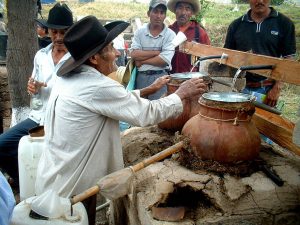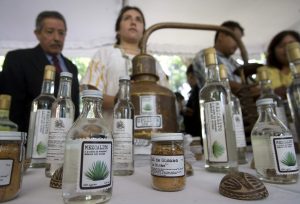
Mexico City, Sep 1 (EFE).- The production of mezcal has undergone an exponential growth in the last few years, largely as a result of efforts by producers from the Mexican state of Oaxaca to position the beverage on the market, who now fear that the expansion of the protected designation of origin for mezcal will destroy what they have worked for.
The expansion of the protected designation of origin (DOM) to three additional states – Morelos, Aguascalientes and the State of Mexico – has outraged mezcal producers from Oaxaca who claim that these regions do not have a strong tradition in the distillation of agave.
“Mezcal means culture. Its production is an artisanal process that is passed down from generation to generation, which gives it its value,” the president of the National Chamber of the Industry of Mezcal (Canaimez), Ray Chagoya, told EFE.
The mezcal producers fear that the Mexican Institute of Industrial Property’s decision to expand the DOM could affect their competitivity and lower the quality of the beverage.
The DOM previously included nine Mexican states, though Oaxaca has been the indisputable leader, producing 87 percent of the mezcal, according to figures from the Regulatory Council of Mezcal.
That is why producers from Oaxaca have led the fight against the expansion of the DOM, and even the state’s governor, Alejandro Murat, has attended some of the protests organized in the Mexican capital and other cities.
According to Chagoya, expanding the DOM to include the three other states was a decision that was done without a proper analysis of the history of mezcal production in those regions.
“Now that mezcal is well positioned on the market, it is not right for other actors to want to take advantage of the hard work that was done. That is unfair competition,” he said.

Chagoya recalled that when the DOM was created in 1994, mezcal producers from Oaxaca opened the door for other regions to be included, though only five states expressed interest.
The other states that produced mezcal “thought that it was a second-rate beverage, and did not see its value,” Chagoya said.
By 2017, however, the production of mezcal had risen to 4 million liters (more than 1 million gallons) – a 281 percent rise in five years – of which half were exported.
In addition, 17,000 people are directly employed in the mezcal industry, which has also created 75,000 indirect jobs, benefiting many rural, and often poor, rural communities.
Chagoya said that the expansion of the DOM to places like Morelos and the State of Mexico, which are near the Mexican capital, would represent an unfair competition for producers from Oaxaca, where mezcal production is often carried out in remote areas.
“That could amount to unfair competition for artisanal mezcal producers from Oaxaca,” he said.
